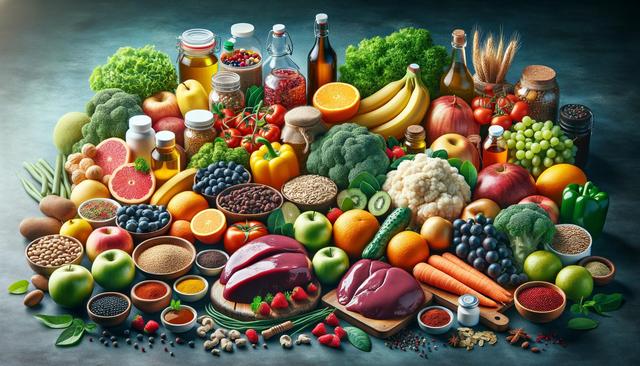Understanding Fatty Liver and Its Causes
Fatty liver, or hepatic steatosis, occurs when fat accumulates in liver cells. While small amounts of fat in the liver are normal, excessive buildup can lead to inflammation and liver damage over time. This condition is often linked to obesity, insulin resistance, high cholesterol, and poor dietary habits. Non-alcoholic fatty liver disease (NAFLD) is the most common form and is not related to alcohol consumption. Recognizing the underlying causes is essential for managing and reversing fatty liver through natural means. Lifestyle and dietary changes are often the first recommendations made by healthcare professionals, as these adjustments can significantly influence liver function and overall metabolic health.
Impact of Diet on Liver Health
What you eat plays a critical role in either contributing to or helping manage fatty liver. Certain foods can aggravate the liver, while others support its detoxification and fat-processing capabilities. A nutrient-dense, low-glycemic diet rich in whole foods is often associated with improved liver function. Key dietary strategies include:
- Increasing fiber intake from vegetables, legumes, and whole grains
- Choosing lean sources of protein like fish, tofu, and legumes
- Reducing intake of added sugars and refined carbohydrates
- Including healthy fats from sources like avocados, nuts, and olive oil
In particular, reducing fructose consumption, often found in sugary beverages and processed snacks, has been shown to help reduce liver fat accumulation. Incorporating antioxidant-rich foods such as leafy greens, berries, and green tea may also help minimize oxidative stress on the liver.
Beneficial Natural Foods and Their Effects
Some natural foods are especially supportive of liver health due to their anti-inflammatory and antioxidant properties. These foods not only help reduce liver fat but also promote overall well-being. Examples include:
- Garlic: Contains compounds that activate liver enzymes and aid detoxification
- Turmeric: Rich in curcumin, which has anti-inflammatory effects that may protect liver cells
- Cruciferous vegetables: Like broccoli and Brussels sprouts, known to boost liver enzyme levels
- Fatty fish: High in omega-3 fatty acids that may reduce liver fat and inflammation
Incorporating these foods regularly into meals can contribute to gradual improvements in liver function. It is also helpful to drink plenty of water and limit sodium intake to reduce water retention and support metabolic processes.
Natural Supplements That Support Liver Function
In addition to whole foods, certain natural supplements may support liver health when used appropriately. These should be regarded as complementary to a balanced diet and not as a substitute for medical treatment. Commonly used supplements for fatty liver include:
- Milk thistle: Contains silymarin, which may help regenerate liver tissue and reduce inflammation
- Omega-3 fatty acids: Found in fish oil supplements, linked to reduced liver fat levels
- Vitamin E: An antioxidant that may reduce liver inflammation in individuals with NAFLD
- N-acetylcysteine (NAC): Supports glutathione production, a key antioxidant in liver detoxification
Before beginning any supplement regimen, it is important to consult a healthcare provider, especially if you have pre-existing health conditions or are taking medications. Supplements should be chosen for their quality and purity, as not all products on the market are equally effective or safe.
Lifestyle Changes That Make a Difference
Diet alone may not be sufficient to manage fatty liver. A comprehensive approach that includes consistent lifestyle changes can significantly improve liver health. Regular physical activity helps reduce insulin resistance and burn excess fat, including liver fat. Aiming for at least 150 minutes of moderate aerobic exercise per week is often recommended. Other helpful lifestyle adjustments include:
- Maintaining a healthy weight through gradual weight loss
- Getting adequate sleep to support hormonal balance and liver function
- Managing stress with techniques such as meditation, yoga, or deep breathing
- Limiting alcohol intake, as alcohol can exacerbate liver fat accumulation
Even modest weight loss of 5-10% can lead to significant reductions in liver fat and improvements in liver enzyme levels. Monitoring progress with regular checkups and liver function tests can help track improvements and adjust strategies as needed.
Conclusion: Supporting Liver Health Naturally
Managing fatty liver through natural treatments is achievable with a combination of diet, targeted supplements, and sustainable lifestyle changes. Focusing on whole, nutrient-rich foods and reducing processed items can improve liver function over time. Natural foods like garlic, turmeric, and cruciferous vegetables offer additional support, while supplements such as milk thistle and omega-3s may provide further benefits when used responsibly. Consistency is key, and gradual improvements in habits can lead to meaningful health outcomes. Individuals dealing with fatty liver should always work in collaboration with their healthcare provider to develop a well-rounded and personalized approach to liver wellness.


